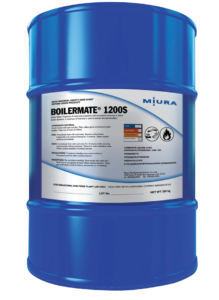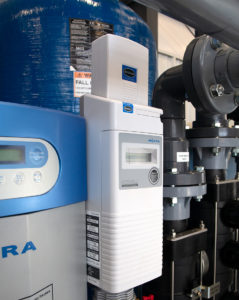Do Miura Boilers Require Special Water Treatment?
One of the most common myths that we encounter is the idea that Miura boilers call for specialized boiler water treatment. To help dispel this myth, let’s walk through how water treatment works with Miura’s compact water tube boilers and explain how Miura monitoring systems identify issues before they become problems.
Miura’s unique design of water tube steam boilers has many advantages, including greater safety, more efficient steam production, and fewer emissions of harmful substances. However, such stark differences from traditional fire tube boilers have caused many people who are unfamiliar with boiler maintenance best practices to ponder if our boilers require special water treatment. However, this is simply not the case.
While Miura’s modular water tube steam boilers are designed differently than conventional fire tube boilers, the basic water treatment process for these steam systems is no more specialized than any other steam boiler on the market.
Feedwater Treatment in Miura Boilers vs. Other Boilers

First, let’s dive deeper into the root of this myth. As we mentioned, the confusion over whether or not Miura’s boilers need special water treatment likely stems from them being designed so differently from conventional boilers.
How exactly are they different? The most important distinction with Miura’s boilers is their compact size and low-water content, which results in less surface area inside the boiler tubes. Due to the reduced amount of surface area, scaling can become a problem faster in a Miura boiler than a fire tube boiler. For example, water that could cause 1/16’’ of scaling in a Miura boiler would only cause 1/64’’ of scaling in a conventional fire tube boiler.
Boiler scaling has serious consequences. The reduced heat transfer capacity can affect boiler efficiency and if left unchecked, scaling can ultimately lead to tube failure that brings your steam generation processes to a grinding halt. Nobody has time for that kind of downtime, which is why it’s critical to stay on top of the internal treatment of your boiler feedwater.
Although Miura boilers may be more prone to scaling than fire tube boilers, that doesn’t mean water treatment has to be done any differently. All it means is that Miura boilers should be monitored more closely to prevent, detect, and alleviate potential scaling before it becomes a serious issue.
Whether you’re using a water tube boiler or a fire tube boiler, the actual water treatment processes you use does not change. Using water treatment chemicals to prevent corrosion or a water softener to prevent scaling will be recommended for any boiler. In fact, if you have a specific water treatment solution for a fire tube boiler, it’s perfectly fine to continue using the same treatment solution after replacing your old boiler with a Miura boiler system.
Miura Steam Boiler Water Treatment Systems
While the water treatment requirements for a Miura boiler are fundamentally the same as any other boiler, the difference between Miura boilers and conventional steam boilers is that Miura places a greater emphasis on water treatment programs that help monitor the quality of the boiler feedwater and detect issues before they become serious problems.
At Miura, we want to do everything we can to maximize the lifespan of your boiler and make sure it continues to operate at a high level for many years to come. That’s why we offer a multitude of boiler treatment systems, products, and equipment that help our customers monitor water quality and actively prevent scale from forming in boilers.
 BOILERMATE®: Our eco-friendly, silica-based chemical treatment product helps prevent solid items from building up on the interior surface of the boiler, which helps prevent damage to the metal components of the boiler over time.
BOILERMATE®: Our eco-friendly, silica-based chemical treatment product helps prevent solid items from building up on the interior surface of the boiler, which helps prevent damage to the metal components of the boiler over time.- Chemical Monitoring System: This system offers accurate administration of BOILERMATE® product to effortlessly monitor and protect your steam boiler from gradual scale build-up.
- Miura Online Maintenance (MOM): This remote monitoring system allows Miura-certified technicians to track and identify potential boiler treatment problems so they can work with those on-site to fix minor issues before they lead to more serious issues or boiler failure.
 Colormetry Hardness Detection System: This system automatically monitors water quality and connects with our MOM remote monitoring system to alert you if any hardness is detected so the situation can be rectified as soon as possible. If there is any water hardness leakage in a Miura boiler, it will automatically increase the boiler blowdown percentage to help prevent any scale from forming.
Colormetry Hardness Detection System: This system automatically monitors water quality and connects with our MOM remote monitoring system to alert you if any hardness is detected so the situation can be rectified as soon as possible. If there is any water hardness leakage in a Miura boiler, it will automatically increase the boiler blowdown percentage to help prevent any scale from forming.- MW Water Softener: Maintaining a soft water supply is critical for protecting your boiler investment. Our MW regeneration process offers a dual-tank water softener design that provides your boiler system with soft water 24/7/365.
- Scale monitor thermocouple: This device, which is fitted onto every Miura boiler, monitors the surface temperature of the water inside boiler tubes to help detect scale during the early stages before it starts to have an impact on the health and efficiency of the boiler.
- Feedwater Tanks: Miura offers standard and custom feedwater tanks in a variety of sizes that allow you to store your water supply and easily administer chemical treatment to your pressure vessel.
 Deaerator Tanks: Our deaeration vessels are designed to reduce the dissolved oxygen content of the feedwater to no more than 0.005 cc/liter (7ppb) and reduce the titratable free carbon dioxide to zero.
Deaerator Tanks: Our deaeration vessels are designed to reduce the dissolved oxygen content of the feedwater to no more than 0.005 cc/liter (7ppb) and reduce the titratable free carbon dioxide to zero.- Reverse Osmosis (RO) System: A reverse osmosis system is a component of your boiler feedwater system that purifies and removes minerals from your feedwater before entering a boiler, which helps prevent the scale build-up and corrosion within the machinery.
Want to learn more about how water treatment requirements for Miura boilers differ from other steam boilers? Download our white paper:
MIURAmythbusters-Whitepaper-specialwatertreatment
Contact Miura today to learn more about how we go the extra mile to monitor your boiler so it remains in tip-top shape for as long as possible.
